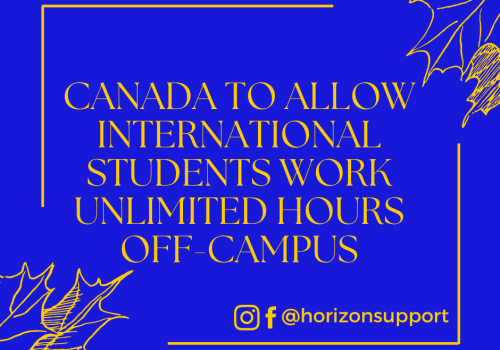The number of hours that international students can work off-campus during their studies will be increased in Canada.
The move, announced by Canadian Immigration Minister Sean Fraser on Friday, October 7, 2022, is intended to help alleviate the country’s chronic labor shortage.
Instead of being limited to 20 hours per week, post-secondary international students will be able to work as much as they want beginning November 15. The interim measure will be in effect until December 31, 2023.
Candidates who have already applied for a Study Permit are included in the new measure if their application is approved.
With the economy expanding faster than employers can hire new workers, Canada must consider all options to ensure that the skills and workforce required to fuel growth are readily available.
To address this labor shortage, immigration will be critical.
“By allowing international students to work more while studying, we can help alleviate pressing needs in many sectors across the country while also providing more opportunities for international students to gain valuable Canadian work experience and contribute to our short-term recovery and long-term prosperity,” said the Minister.
The step is intended to benefit Canadian employers while also providing international students with the opportunity to gain more Canadian work experience, which is especially important given their long-term goal of transitioning to permanent residence.
With over 500,000 international students already in the country, the decision will provide an immediate boost to the country’s struggling labor market.
Meanwhile, Canada has announced a pilot project to automatically process Study Permit extensions.
According to Immigration, Refugees, and Citizenship Canada (IRCC), the project will include applications with a high approval rate because all candidates have previously studied in Canada.
The decision is intended to help reduce the IRCC’s massive backlog of applications.
“If the pilot proves successful, it will be expanded to help reduce processing times and allow officers to focus on more complex applications,” the IRCC said.
These latest measures to benefit international students are just a few of many that Canada has implemented recently in order to maintain its reputation as one of the best places in the world to study.
It recently extended a Covid-19 measure that allows candidates studying online from other countries to apply for a Post-Graduation Work Permit (PGWP).
Meanwhile, those with expired or expiring PGWPs are now eligible for an 18-month open work permit, giving them an additional opportunity to gain the work experience needed for a permanent residence application.
According to IRCC, Canada processed over 450,000 study permit applications between January and August, up from 367,000 in the same period in 2021.

